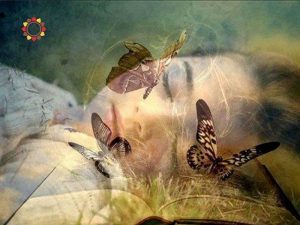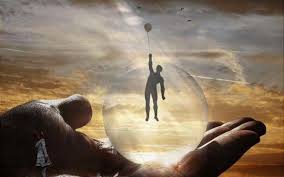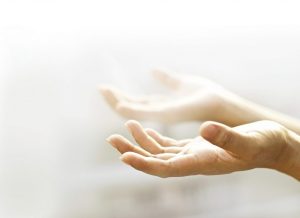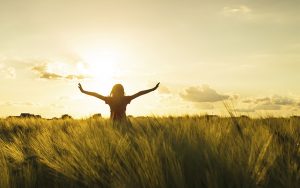 Our Moving into Meditation class continues to draw inspiration from The Five Invitations, Frank Ostaseski’swonderful book about living with the awareness that we’re going to die. His book distills what he’s learned into Five Invitations we can answer in living a conscious life in connection with each other. In today’s class we continued working with the fourth invitation: to find a place of rest in the middles of things. We also drew inspiration from Poet, peace activist and meditation teacher Thich Nhat Hanh who is affectionately referred to as Thay by his many students. Nearly all of his teachings on mindfulness emphasize living in the present moment – the gateway to inner peace. Both teachers emphasize the importance of relaxing into the present moment so that we can allow life to unfold and lessen our habitual struggles.
Our Moving into Meditation class continues to draw inspiration from The Five Invitations, Frank Ostaseski’swonderful book about living with the awareness that we’re going to die. His book distills what he’s learned into Five Invitations we can answer in living a conscious life in connection with each other. In today’s class we continued working with the fourth invitation: to find a place of rest in the middles of things. We also drew inspiration from Poet, peace activist and meditation teacher Thich Nhat Hanh who is affectionately referred to as Thay by his many students. Nearly all of his teachings on mindfulness emphasize living in the present moment – the gateway to inner peace. Both teachers emphasize the importance of relaxing into the present moment so that we can allow life to unfold and lessen our habitual struggles.
Guided Relaxation
Welcome . . . to this moment . . . this space . . . a place of rest in the middle of things . . . simply being . . . just as you are . . . not trying to rest . . . perhaps just relaxing whatever doing that obstructs your rest . . . sensing into your being . . . becoming aware of the subtle pull of desire . . . or vibration of restlessness . . . the signature of seeking . . . and here is this welcome . . . this invitation to relax and be . . . exploring a place of effortlessness . . . allowing whatever is happening in the moment and relaxing . . . considering the notion that nothing is missing . . . we’re complete . . . we’re at home in ourselves . . . the answers we seek live inside us . . .
. . . we share a wholesome desire to know and love our true nature . . . to be present . . . to be open . . . we can feel what is true, when our minds are open and we are at peace . . . Frank O. writes:
“One of the qualities of a truly open mind is deep restfulness. We come to this restfulness by accepting & understanding our desires, not by rejecting them. We surrender our strategies & resistance. . . .”
 He describes a practice in which he “always pauses at the threshold of a room, because that pause breaks the momentum of habit. It gives us a choice.
He describes a practice in which he “always pauses at the threshold of a room, because that pause breaks the momentum of habit. It gives us a choice.
That choice, the only choice we have . . . is to be open or closed. Open to what is unfolding . . . allowing of it. . . . “ Here, now we can find ourselves resting in allowing. . . . in these moments, we’re not missing anything . . . nothing we need to seek . . . giving ourselves to rest . . . Can we feel: “Body at rest. Heart at rest. Mind at rest. Consciousness at rest.”
Thich Nhat Hanh writes that resting is the first part of meditation. He uses a metaphor of tossing a pebble into the river. It sinks to the bottom and comes to rest. River waters continue to flow. Thai encourages us to allow ourselves to sink naturally without effort into our meditation posture . . . to allow our sitting be a position of resting. He writes:
“. . . We are always struggling; struggling has become a kind of habit. We cannot resist being active . . . We struggle even during our sleep. It is very important to realize that we have the habit energy of struggling. When we. . . recognize a habit when it manifests itself . . . it will lose its energy & will not be able to push us anymore. . .
. . . Our consciousness also needs to rest in order to restore itself. Our consciousness is just like our body. Our body knows how to heal itself if we allow it the chance to do so. . . . Only if we know how to allow our body and soul to rest can they heal themselves.
 . . . The greatest of all miracles is to be alive. . . . We are making steps on this beautiful planet. This is already performing a miracle. . . . But we have to be here in order for the miracle to be possible. We have to bring ourselves back to the here and the now. Therefore each step we take becomes a miracle. . . . each step will be very nourishing and healing. You walk as if you kiss the earth with your feet . . . There is a lot of love in that practice of walking meditation.
. . . The greatest of all miracles is to be alive. . . . We are making steps on this beautiful planet. This is already performing a miracle. . . . But we have to be here in order for the miracle to be possible. We have to bring ourselves back to the here and the now. Therefore each step we take becomes a miracle. . . . each step will be very nourishing and healing. You walk as if you kiss the earth with your feet . . . There is a lot of love in that practice of walking meditation.
. . . the present moment is the only moment where you can touch life. Life is only available in the present moment. . . . in order to be alive again go back to the present moment . . . to touch life deeply . . .
. . . When you are in the present moment. . . you have an opportunity to touch the conditions of your happiness. . . . you can be happy right away. . . .
When we practice walking, we might be aware that we have strong feet. . . . That is one condition for happiness that is available. When I breathe in & I become aware of my eyes, I encounter another condition for my happiness. . . . We have so many conditions . . . for our happiness. . .
Breathing in, I’m aware of my heart. Breathing out I smile to my heart. . . . when you practice like that you touch your heart with your mindfulness. . . .”
Rosemerry Trommer’s poetic imaginings:
One Morning
One morning
we will wake up
and forget to build
that wall we’ve been building,
the one between us
the one we’ve been building
for years, perhaps
out of some sense
of right and boundary,
perhaps out of habit.
 One morning
One morning
we will wake up
and let our empty hands
hang empty at our sides.
Perhaps they will rise,
as empty things
sometimes do
when blown
by the wind.
Perhaps they simply
will not remember
how to grasp, how to rage.
We will wake up
that morning
and we will have
misplaced all our theories
about why and how
and who did what
to whom, we will have mislaid
all our timelines
of when and plans of what
and we will not scramble
to write the plans and theories anew.
 On that morning,
On that morning,
not much else
will have changed.
Whatever is blooming
will still be in bloom.
Whatever is wilting
will wilt. There will be fields
to plow and trains
to load and children
to feed and work to do.
And in every moment,
in every action, we will
feel the urge to say thank you,
we will follow the urge to bow.
